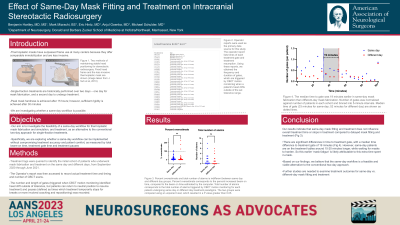Feasibility of Same-Day Mask-Based Stereotactic Radiosurgery
Feasibility of Same-day Mask-based Stereotactic Radiosurgery
Friday, April 21, 2023


Benjamin Hartley, MD, MS
Fellow, Neurosurgical Oncology
North Shore University Hospital
Brooklyn, New York, United States
ePoster Presenter(s)
Introduction: With the advent of mask-based (MB) Gamma Knife stereotactic radiosurgery (SRS), one of the purported advantages of a framed approach is the ability to treat patients on a single day (“wheels in to wheels out”). We examined factors affecting treatment times in patients having MB SRS on the same day as mask fitting and treatment planning, versus those having it done on different days.
Methods: We compared same-day mask fitting and treatment with traditional post-fitting delayed treatment (minimum one day between fitting and treatment) on 100 patients who underwent Gamma Knife (GK) SRS from September 2020 through June 2021. Patients with single-session treatment and those on their first session of hypofractionated treatment were included. Data from the GK console were extracted and analyzed by calculating T-scores using standard patient database and statistical software. Outcomes included treatment gate frequency, treatment stop frequency, and overall treatment time.
Results: We found a significant increase in treatment gates in the same-day treated patients compared to different-day (8.4 vs 4.5), but this did not translate to a significant difference in treatment stops or overall treatment times between groups. Importantly, treatment gate frequency peaks were delayed roughly 25 minutes on average in the different-day patients, corresponding to a 25-minute extra mask time for positioning and hardening prior to treatment initiation experienced by the same-day patients.
Conclusion : Same-day mask fitting and treatment does not influence overall treatment time or stops in treatment compared to delayed mask fitting and treatment. Significant differences in treatment gate frequency are likely due to patient fatigue, which can be ameliorated with medications or breaks built into the workflow. Further studies will examine treatment outcomes for same-day vs. different-day mask fitting and treatment groups.
Methods: We compared same-day mask fitting and treatment with traditional post-fitting delayed treatment (minimum one day between fitting and treatment) on 100 patients who underwent Gamma Knife (GK) SRS from September 2020 through June 2021. Patients with single-session treatment and those on their first session of hypofractionated treatment were included. Data from the GK console were extracted and analyzed by calculating T-scores using standard patient database and statistical software. Outcomes included treatment gate frequency, treatment stop frequency, and overall treatment time.
Results: We found a significant increase in treatment gates in the same-day treated patients compared to different-day (8.4 vs 4.5), but this did not translate to a significant difference in treatment stops or overall treatment times between groups. Importantly, treatment gate frequency peaks were delayed roughly 25 minutes on average in the different-day patients, corresponding to a 25-minute extra mask time for positioning and hardening prior to treatment initiation experienced by the same-day patients.
Conclusion : Same-day mask fitting and treatment does not influence overall treatment time or stops in treatment compared to delayed mask fitting and treatment. Significant differences in treatment gate frequency are likely due to patient fatigue, which can be ameliorated with medications or breaks built into the workflow. Further studies will examine treatment outcomes for same-day vs. different-day mask fitting and treatment groups.
